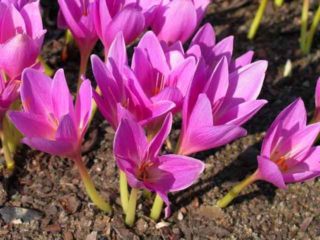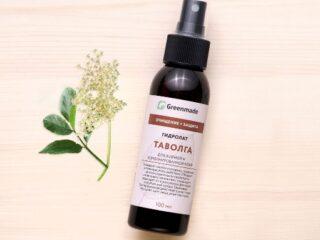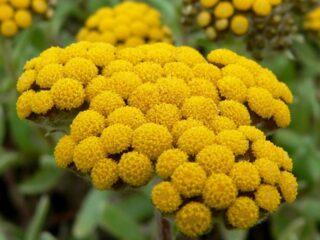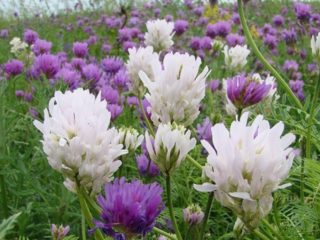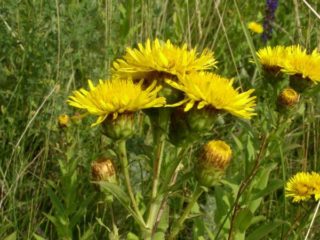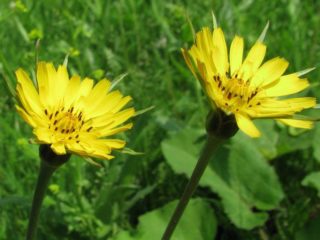Content
Autumn colchicum (Colchicum autumnale) is a perennial herb, which is also called colchicum. Georgia is considered his homeland, from where the culture spread to different countries of the world. The plant has received universal recognition for the graceful beauty of flowers and the variety of their shades. A feature of the culture is that its shoots and leaves grow in spring, and flowering occurs in autumn, when all garden crops are already preparing for wintering. This contributed to the growing popularity of the plant as an element of landscape design. In addition, planting and caring for an autumn crocus does not cause difficulties even for novice gardeners. But there are certain features that should not be ignored.
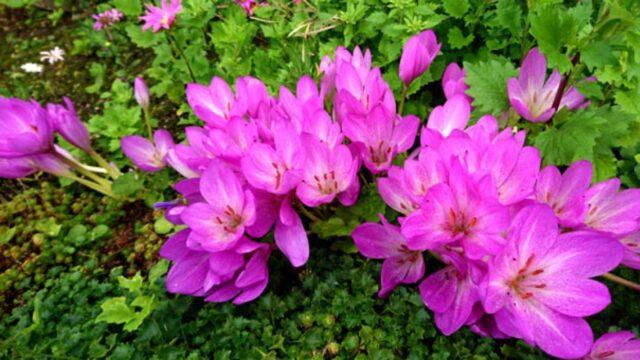
Colchicum is among the poisonous, as it contains alkaloids
Description of the autumn crocus
Colchicum is a bulbous plant with a short growing season. For the winter, its aboveground part dies off completely, and with the arrival of spring, the vegetation is resumed. Colchicum autumnal grows a large number of short shoots and narrow elongated leaves with parallel venation. The height of the plant in spring does not exceed 15 cm. With the onset of the growing season of autumn crocus stops and its aboveground part dries up. With the arrival of autumn, colchicum peduncles appear, but already without leaves.
Colchicum buds are tulip-shaped or bell-shaped. Each of them includes six petals. Their color can be white, pink, lilac, purple, depending on the variety. Flowers are simple, at the moment of full disclosure their diameter reaches 4-5 cm. Inside the buds you can see six stamens.
When pollinated, a three-nested ovary is formed. The fruit of the autumn crocus is a rounded box, inside which there are numerous small seeds. When ripe, it opens its three valves, according to the number of carpels.
The underground part of the plant is presented in the form of a corm. If you cut it, then inside you can see a dense, homogeneous core without scales. Growing up, one plant can occupy up to 20 square meters. cm square. After the spring growing season, the crocus corm begins to actively grow and accumulate strength for autumn flowering. At its end, the main bulb dies off completely, but leaves 2-3 babies behind.
Where the autumn crocus grows
Under natural conditions, colchicum can be found in Europe, except for Scandinavia, North America, the Mediterranean, as well as in Western and Central Asia. The autumn crocus prefers to grow on damp forest edges and in damp meadows. Due to its unpretentiousness, its plants began to be cultivated in all countries with a temperate climate.
Differences between autumn crocus and crocus
These two plants are often confused with each other, as they are very similar in appearance.But knowing their characteristic differences, you can easily determine the type of culture.
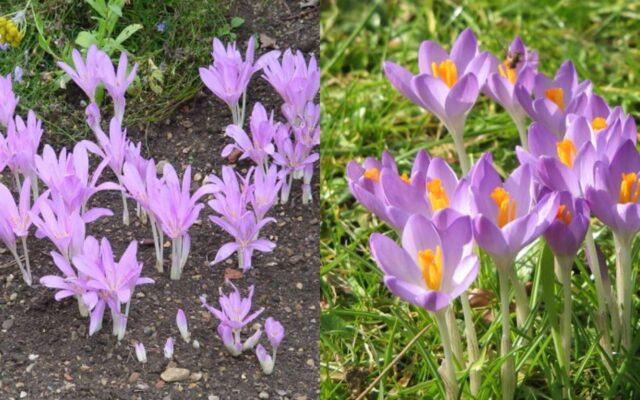
Colchicum flowers are much larger
The main signs of autumn crocus and crocus:
- The leaves of the first are wide, earthy green in color, glossy. While the second plate is narrow, matte, with a white stripe along the edges.
- The colchicum has six stamens inside the flower, while the second has only three.
- Crocus corms have the correct shape, and in the autumn crocus, they are larger, and the growth point is shifted to the side from the top.
- The shade of the petals in Colchicum is mainly pink or white, while in the crocus it is predominantly blue-violet.
- The autumn crocus also differs in chemical composition. It contains a large number of alkaloids, a high concentration of which is concentrated in the underground part of the plant. Crocus is completely harmless to humans and animals.
Autumn crop varieties
Thanks to the selection carried out, plant species were obtained not only with other shades, but also with double flowers. The bred varieties are characterized by high decorative qualities. In addition, they have a longer flowering period. Therefore, you should familiarize yourself with the most popular of them, as they have received universal recognition from gardeners.
Beaconsfield
Hybrid variety of autumn crocus. It is characterized by the large size of simple tulip-shaped flowers. In this case, the tube of the glass in the Beckinfield variety has a white tint, and the upper limb is lilac-pink. The height of the plant during the formation of peduncles reaches 20-30 cm.
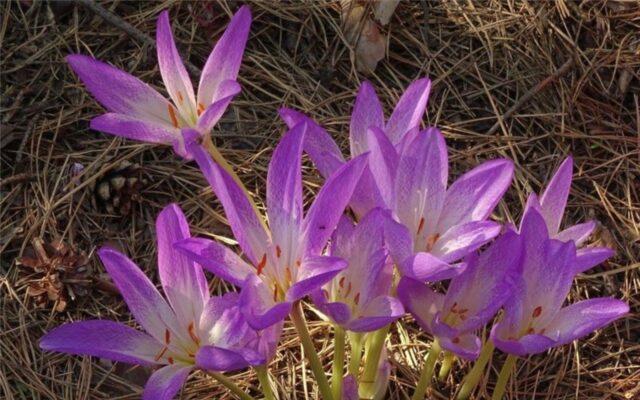
There is also a small checkerboard pattern on the petals of the Beckinfield variety.
Lilac wonder
The variety is distinguished by large tulip-shaped buds. Flowering occurs in September-October, depending on the climate of the region. The shade of the petals of the Lilak Wande variety is deep purple. There is a white spot in the center of a simple flower. Plant height reaches 30 cm.
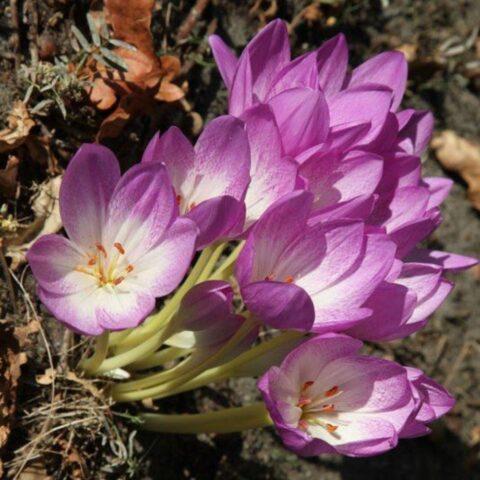
The autumn crocus Lilac Wande is characterized by bright and abundant flowering.
Double Alboplenum
One of the most beautiful varieties of autumn crocus. It is distinguished by large terry buds of a snow-white color. The autumn crocus flower Double Alboplen (pictured below) begins to form them in mid-September or early October. Plant height reaches 10-20 cm. Can be grown in a sunny area and in partial shade. The diameter of its flowers at full disclosure is 8-10 cm.
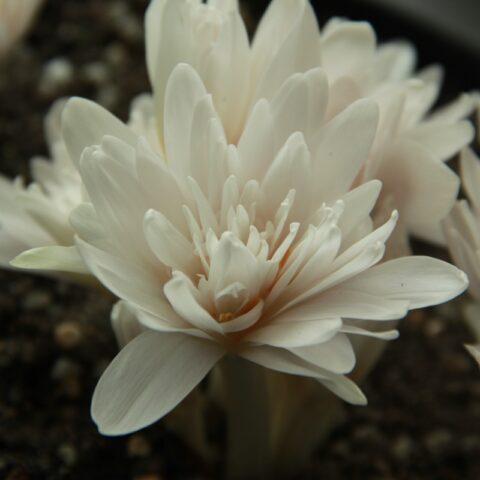
Double Alboplen easily adapts to any climatic conditions
Album
Another variety with white buds. Its flowers are tulip-shaped, simple. Six stamens with yellow anthers are clearly visible in the center. The flowering period for the Album variety begins at the end of September or in the middle of October if rainy weather sets in. The height during the formation of peduncles reaches 30 cm.
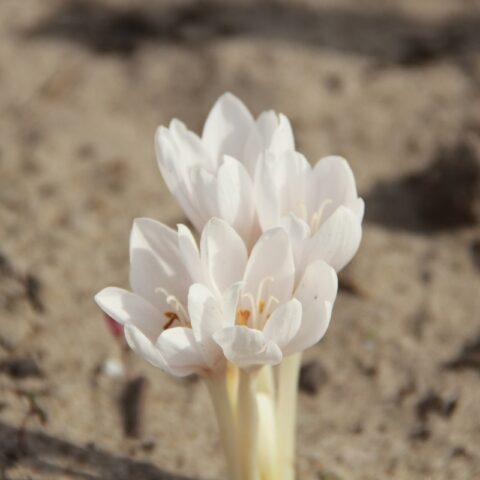
Album variety is distinguished by increased endurance
Pleniflorum
Terry variety of autumn crocus. Has a bright pink color of the petals. The diameter of the buds at full opening reaches 8-9 cm. The height of the plant is 20-25 cm. The flowering period of the Pleniflorum variety begins in early October and lasts about 10-12 days in the presence of favorable conditions.
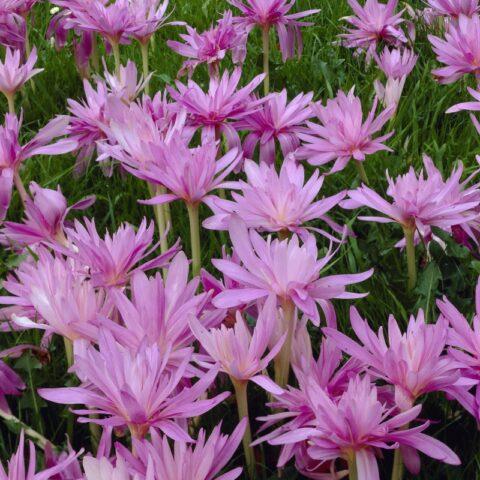
The Pleniforum variety is characterized by a lush, long flowering
Reproduction methods
You can propagate autumn crocus with daughter corms and seeds. The first method allows you to get new seedlings without much difficulty, but there will be a limited number of them. Moreover, it can be carried out for plants at least three years old.
To do this, you should dig up a kolchikum bush in the fall. It is possible to determine the need for its division by the meager flowering, despite the large size of the bush.After separating the children, they must be immediately dropped off at a permanent place.
The seed method of propagating a culture is more laborious. But it makes it possible to get a large number of young seedlings at the same time. It is necessary to plant the seeds of colchicum immediately after collection in open ground. This will allow them to undergo natural stratification in winter. For the plant, you need to pick up a sunny, open area and dig it up. Then carefully level the surface of the soil and simply sprinkle the seeds on top. At the end, water the beds abundantly using the sprinkling method, which will allow them to deepen into the soil by 1-2 cm.
Colchicum seeds of autumn, even in the presence of favorable conditions, can germinate for several years. When they get stronger and reach a height of 5 cm, the seedlings can be transferred to a flower bed.
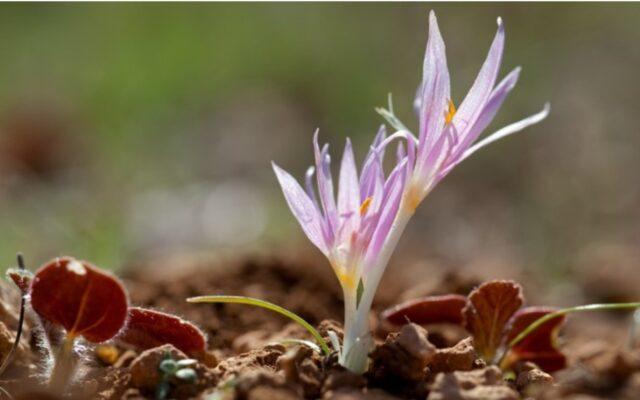
Colchicum from seeds blooms 6-7 years after planting
Planting and caring for an autumn crocus flower
In order for the plant to please the eye with its flowering annually and to grow its daughter bulbs well, it is necessary to provide it with favorable conditions. Therefore, you should choose the right place for the autumn crocus, plant in a clearly defined time frame and provide full care in the future. Indeed, despite the fact that this culture is undemanding, there are still certain features that need to be paid attention to.
When to plant crocus bulbs in autumn
It is necessary to plant the planting material of the plant in the first half of September. This will enable the autumn crocus to fully take root before the arrival of constant cold weather. In this case, the plant will survive the winter without any problems and begin growing with the arrival of spring.
Site and soil requirements
For autumn crocus, it is recommended to choose slightly shaded areas under the canopy of shrubs and trees. It can also be grown in a sunny open area. However, in this case the plant height will be lower and the flowering time will be reduced. The soil for the autumn crocus should be light and well-drained. The best option is loamy and sandy loam soil with a low or neutral acidity level.
Two weeks before planting the autumn crocus, you need to dig up the area and add humus at the rate of 10 kg per meter of area.
How to plant bulbs
Pre-planting plant material must be disinfected. To do this, prepare a working solution of the fungicide "Maxim" and soak the corms of colchicum in it, according to the attached instructions.
Planting should be carried out in holes at a distance of 20 cm from each other. Lay a layer of river sand at the bottom of each of them, which will prevent rotting of the bottom during prolonged rainy weather. A layer of earth should be poured over it and a pinch of superphosphate and wood ash should be added. After this, the fertilizer should be thoroughly mixed with the soil to avoid burns to the corms. At the end of the procedure, the garden with the autumn crocus should be watered abundantly by sprinkling.
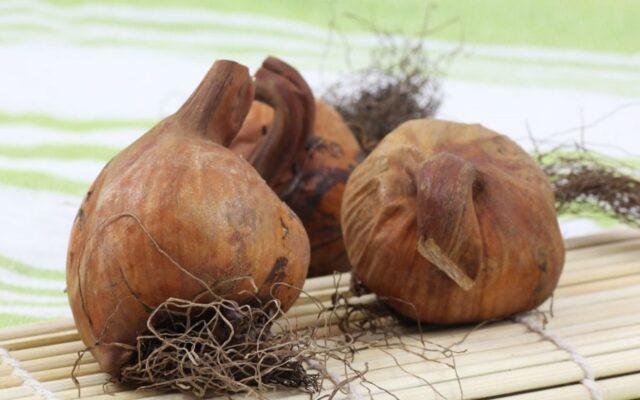
Planting depth of small bulbs - 6-8 cm, and large ones - 10-15 cm
Follow-up care
The autumn crocus is one of the undemanding crops. Therefore, caring for him is not particularly difficult.
It is not necessary to water the plant in the spring, since there is enough moisture in the soil during this period. It is important to moisturize only in the fall before flowering in the absence of seasonal rains.
Colchicum should be fed annually in early spring at the beginning of the growing season. During this period, organic matter or urea should be used to build up green mass. The second time to fertilize is recommended in mid-May.At this time, potassium sulfate should be used, which helps to prepare the corm for autumn flowering.
The autumn crocus is characterized by high frost resistance. But, despite this, experienced gardeners recommend covering planting crops with mulch for the winter. For this, spruce branches, humus, dry foliage, compost are suitable. The covering layer should be 7-8 cm. It should be removed in early spring, without waiting for stable heat, otherwise the corms may vanish.
Diseases and pests
Colchicum autumnal has a high natural immunity. Therefore, he rarely suffers from diseases and pests. But if the growing conditions do not match, its resistance decreases.
The plant can be damaged by slugs that feed on young leaves and peduncles. To repel the pest, it is recommended to sprinkle the soil between the plantings of colchicum with wood ash, crushed shellfish or tobacco dust.
With prolonged rainy weather or excessive watering, the plant suffers from gray rot. The disease can be recognized by the characteristic bloom on the leaves and flowers. For treatment, it is recommended to spray the crocus with a solution of the drug "Skor", "Hom" or "Topaz".
Medicinal properties of autumn crocus and contraindications
Colchicum has a number of medicinal qualities. It has found application in folk and traditional medicine. In the first case, on its basis, drugs are prepared to help treat gout and rheumatism. And in the second, the plant is used for oncology and neurological diseases.
In some cases, the use of autumn crocus for medicinal purposes can be harmful to health.
Contraindications:
- stomach bleeding;
- the last stage of cancer;
- reduced hematopoiesis process;
- respiratory diseases;
- age up to 14 years;
- individual intolerance.
Conclusion
Planting and caring for the autumn crocus, carried out taking into account the life cycle of the plant and its requirements, will allow it to fully develop and delight with lush flowering. Colchicum looks especially beautiful when planted in groups with different shades of buds and the same flowering period. This makes it possible to extend the summer and dilute the dull, rainy days of autumn with bright colors.
